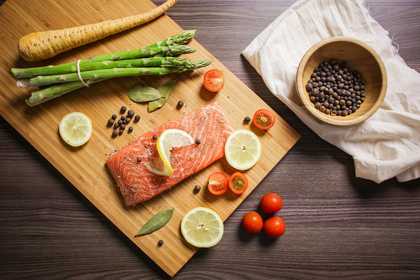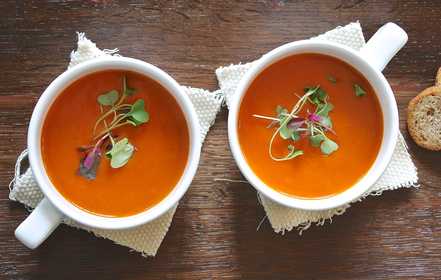Foods to help with burnout and emotional stress

In this busy day and age, many of us feel the effects of burnout, both mentally and physically. Burnout is emotional, mental, and physical exhaustion brought on as a result of stress. It can have some devastating results both professionally and personally if not addressed. Burnout can be combated, however, whether that’s by dedicating some regular ‘me’ time with Yorkshire spa breaks or via the right nutrition. This article highlights the latter, presenting a selection of foods to help combat burnout and emotional stress.
Eat complex carbohydrates
Not all carbohydrates are created equal; complex carbs like pasta can actually provide some great health benefits when it comes to burnout and stress. The key to stopping burnout is preventing extreme stress from occurring so as all carbs prompt the brain to pump the feel-good chemical known as serotonin around the body, this is one type of food that shouldn’t be ignored.
Going for complex carbs over simple carbs is certainly advised, as these take longer to digest. Some great choices to add to your burnout fighting diet would include pasta, wholegrain bread, oatmeal, and even certain breakfast cereals.
Rachael Hartley, a certified intuitive eating counsellor from Rachael Hartley Nutrition, also recommends this approach for those with burnout: “One group of food I would recommend for people who are struggling with emotional burnout are carbohydrate foods, especially fibre-rich carbohydrate sources like oats, brown rice, quinoa, and potatoes. I notice a lot of my clients who are feeling burnt out often go too long without eating, skipping meals and snacks to try and get work done. Going too long without eating, and specifically missing out on carbohydrates, causes the blood sugar to drop, which has a huge effect on mood and energy levels. I'd encourage someone struggling with burnout to eat a meal or a snack every 3-4 hours and be sure to include a source of carbohydrate.”
Soups and warm drinks

There are certain foods out there that are synonymous with feelings of comfort, as well as being warming and relaxing. Soups and warm drinks certainly fall into this category and, as such, should become a part of your diet when fighting burnout. When suffering from emotional stress, you want to be able to relax and enjoy the free time at your disposal, so therefore hearty soups, replete with vegetables, will bring along that feeling of comfort. Stews are also great in this regard, as are hot drinks. Put yourself at ease, relax in the comfort of your home, and reap the nutritional benefits that these foods can provide.
Eat three meals a day
Penny Crowther, an experienced London nutritionist over at Nutritionist London, spoke to us about her tips for avoiding burnout and mentions that eating three proper meals a day can really help: “More recent research suggests that eating little and often is not so good for insulin balance. So, if you are feeling burnt out, a good daily guideline to aim for is three meals and one or two snacks if you need them. It can be very beneficial to give yourself a 12-hour fasting window overnight. For example, if you finish your evening meal by 7.30 pm, you don’t eat again until 7.30 am. Each person is different though and you need to listen to your body, so if you find yourself waking up in the night hungry, this is not for you.”
Foods with healthy fats
Making sure that we consume enough healthy fats is very important for our health, particularly when it comes to our mental state. Omega-3s can really help as they have been found to reduce anxiety, stress, and depression. What types of foods should you add to your diet to help consume a good level of healthy fats and omega-3s? Well, fish would be a great start, particularly salmon, tuna, and sardines. When it comes to healthy snacks, nuts would be ideal, especially walnuts as they contain 2,542mg per serving. Do your brain a favour and make sure your diet contains healthy fats and omega-3s.
High fibre fruits and vegetables
We are not told to eat plenty of vegetables each day for no reason. Making sure your meals contain plenty of fibre-rich vegetables during mealtime will be yet another tool in your arsenal when fighting the effects of burnout. Recent research has found that a high-fibre diet may indeed help relieve stress and anxiety (as a result of the impact the gut can have on the brain), which are two big causes of mental and physical burnout. So, what foods should you be looking at? Well, Healthline has an extensive list that you can take a look at, noting the percentage of fibre content for each food. A few examples are:
- Pears (3.1%)
- Strawberries (2%)
- Carrots (2.8%)
- Broccoli (2.6%)
Sources of protein and magnesium
Penny from Nutritionist London also spoke to us about helpful benefits of protein and magnesium in your diet: “Include protein in breakfast, lunch and dinner. This can be a mix of plant and animal protein. For example, nuts and seeds, eggs, fish, chicken, cheese, tofu, soya or dairy yoghurt. Protein helps keep your blood sugar levels balanced and this helps stabilise your mood and energy levels.
“Magnesium is an essential mineral for healthy nervous system support, energy production and for muscle relaxation. We can become easily depleted in magnesium when stressed and burnt out. Food sources include almonds, green vegetables, seeds, kidney beans, quinoa. If you don’t eat many of these foods, take a supplement of magnesium citrate.”
Bedtime glass of milk

Another food that can help defeat stress is milk – yes, you might be surprised to learn that milk is actually classed as a complete food as it is rich in protein, fat, carbs, vitamins and minerals. Calcium has been found to ease anxiety and mood swings so, if your stress is getting the better of you and you want nothing more than to unwind before heading to bed, consider adding a bedtime glass of milk to your nightly routine. A good night’s sleep is essential when trying to recover from fatigue and mental/physical exhaustion so you should try and do all that you can to relax before bed so that you get the rest you require.
Nutritional tips to help with burnout
- Eat complex carbohydrates
- Consume soups and warm drinks
- Opt for foods with healthy fats
- Add high-fibre fruits and vegetables to your diet
- Include protein and magnesium in your diet
- Enjoy a bedtime glass of milk
We hope the above suggestions have been helpful and provide you with the start you need to fight burnout. If you feel like you need an expert nutritionist to help rework your diet and combat the effects of burnout or emotional stress, there are a number of great people to turn to. Take a look at the Association for Nutrition to find a registered nutritionist in your local area.